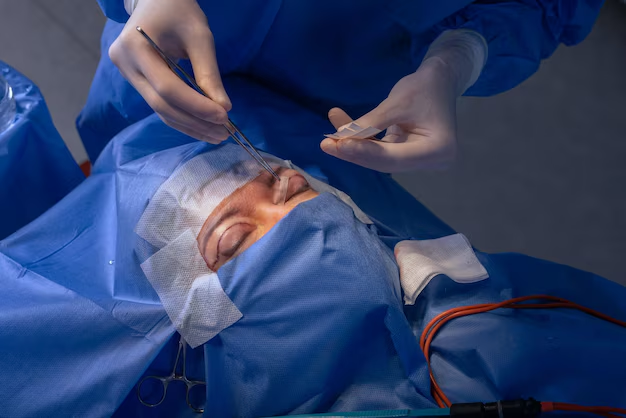Your Guide to How Long Is a Cataract Surgery
What You Get:
Free Guide
Free, helpful information about Cataract FAQ and related How Long Is a Cataract Surgery topics.
Helpful Information
Get clear and easy-to-understand details about How Long Is a Cataract Surgery topics and resources.
Personalized Offers
Answer a few optional questions to receive offers or information related to Cataract FAQ. The survey is optional and not required to access your free guide.
How Long Does Cataract Surgery Typically Take? Discovering the Details and Beyond
When considering cataract surgery, one question often surfaces among patients: how long does it actually take? While the procedure itself is usually brief, the journey to clearer vision involves several steps worth understanding. Let's dive into the intricacies of cataract surgery, preparing you with the information you need to navigate this common yet crucial procedure confidently.
Understanding Cataracts and the Need for Surgery
Cataracts develop when the lens of the eye becomes cloudy, leading to blurry vision and, left untreated, potential vision loss. Recognizing when cataract surgery is necessary typically involves a comprehensive eye examination. An ophthalmologist assesses whether the cataract impairs daily activities such as reading, driving, or recognizing faces.
Common Causes of Cataracts
- Aging: As people age, proteins in the eye's lens begin to clump, forming cataracts.
- Genetic factors: Family history can play a significant role in cataract development.
- Health conditions: Diabetes and high blood pressure may increase cataract risks.
- Environmental factors: Prolonged exposure to UV light and smoking are known contributors.
The Procedure: What to Expect
Pre-Surgery Preparation
Before the surgery, an initial consultation discusses medical history and cataract details. This phase may involve various tests to determine eye health and plan the procedure.
- Preoperative tests: These generally include measurements of the eye to determine the appropriate lens implant size and type.
- Anesthesia discussion: The choice of local or topical anesthesia ensures a comfortable experience for the patient.
During the Surgery
Cataract surgery itself usually lasts between 10 to 20 minutes. Here's how it typically unfolds:
- Anesthesia administration: Numbing drops are applied, ensuring the patient remains comfortable and pain-free.
- Lens extraction: The surgeon makes a small incision in the eye, using advanced technology to break up and remove the cloudy lens.
- Lens replacement: Once the cataract is removed, a clear artificial lens is inserted. This new lens works to restore vision clarity.
Immediate Post-Surgery
After the surgery, you'll spend about 30 to 60 minutes in a recovery area. Medical staff will monitor your recovery as the anesthesia wears off before you're allowed to leave.
Visual Summary: Cataract Surgery Timeline 🕒
| Stage | Timeframe |
|---|---|
| Pre-surgery consultation | Variable (weeks/days) |
| Cataract surgery | 10-20 minutes |
| Recovery monitoring | 30-60 minutes |
Recovery: Returning to Your Routine
The Healing Process
Most patients notice improved vision within a day or two but complete healing usually takes several weeks. During this period, adhering to your doctor's advice is crucial for optimal recovery.
- Eye drops: These may be prescribed to prevent infection and manage inflammation.
- Avoiding strain: Reading or intense visual tasks should be limited initially.
- Follow-up appointments: Regular check-ins ensure your eye heals properly and vision improvements are on track.
Potential Side Effects
While cataract surgery is generally safe, some individuals might experience temporary side effects like blurred vision, sensitivity to light, or mild discomfort. Such symptoms usually subside as healing progresses.
Long-Term Vision Improvements
Expected Vision Enhancements
Cataract surgery often yields significant improvements in vision, contributing to better quality of life and independence. Many individuals find they rely less on glasses post-surgery for everyday tasks.
Risks and Considerations
Though complications are uncommon, they can occur. Discuss potential risks such as infection, inflammation, or lens dislocation with your surgeon to ensure all concerns are addressed.
Insightful Tips for a Smooth Cataract Surgery Experience
- Keep informed: Understanding the procedure and recovery helps alleviate anxiety.
- Plan adequately: Arrange for transportation post-surgery since driving isn’t advisable immediately after.
- Communicate openly: Share any health changes or concerns with your healthcare provider promptly.
Related Concerns: Exploring Alternatives and Lifestyle Adjustments
Non-Surgical Options
Although surgery is often the best course of action, some individuals may delay surgery through:
- Using brighter lights for reading.
- Wearing anti-glare sunglasses.
- Updating prescription glasses.
Lifestyle Adjustments
Making simple lifestyle tweaks can contribute to eye health and potentially slow cataract progression. These include:
- Balanced diet: Emphasize leafy greens and fruits.
- Smoking cessation: Reducing or quitting smoking can benefit eye health.
- Regular eye check-ups: Early detection of changes supports timely decision-making regarding treatment options.
Looking Forward: Preparing for Your Best Vision Yet
Navigating cataract surgery effectively requires understanding its various stages and impacts. With the process demystified, you're now equipped with the knowledge needed for your surgery journey. From the pre-operative phase to exploring post-surgery expectations, each step is central to reclaiming the visual clarity that enhances life's activities.
Remember, open communication with healthcare professionals, coupled with a well-planned approach, ensures you're on track for the best outcomes. Whether you're contemplating cataract surgery soon or planning for the future, having this comprehensive overview at your fingertips empowers better decision-making for your eye health.
By breaking down the cataract surgery process into clear stages, this guide provides a full-spectrum understanding that supports informed decision-making, ensuring readers are prepared and confident. 🏆
What You Get:
Free Cataract FAQ Guide
Free, helpful information about How Long Is a Cataract Surgery and related resources.

Helpful Information
Get clear, easy-to-understand details about How Long Is a Cataract Surgery topics.

Optional Personalized Offers
Answer a few optional questions to see offers or information related to Cataract FAQ. Participation is not required to get your free guide.


